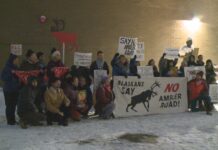We are deeply saddened by the news that Alfred Olango, a Ugandan native living in El Cajon, Calif., was shot dead by police following a call from his sister asking for assistance with a mental health crisis. Olango’s death does not stand alone, but rather is the latest in a long line of deaths of mentally ill people at the hands of police, a burden that falls most heavily on communities of color. Nothing could more profoundly express the need and tragedy of this incident than Olango’s sister’s words: “I called you to come help him, and you killed him.”
We write this as a local organization deeply engaged in providing support for the East African community in San Diego, and a national organization committed to prevention and saving lives in the first place. We are both outraged and heartbroken by this act, and we demand that the nation takes a new approach to addressing the intertwined crises of inadequate mental health support, unaware and unprepared policing, and entrenched racism. At a minimum, police must be adequately trained and prepared to respond to community needs in ways that help.
Tuesday’s shooting is just the latest example of how poor and inadequate police training around mental illness combined with systemic racism to produce a devastating result. In fact, at least a quarter of all people killed by law enforcement suffer from one or more mental disorders. Many people are killed by the police who were called upon to assist them in moments of crisis. Outrage and anxiety are building in the communities most frequently impacted by these ongoing incidents, which further erodes well-being and resilience.
“I am afraid for my life whenever I have an encounter with a law enforcement officer. I am not sure about how to react— should I run, should I stop. I am in so much fear,” said Jama Mohamed, program coordinator at United Women of East Africa, a San Diego nonprofit dedicated to providing culturally competent health, educational, and advocacy services for East African women and families in City Heights, San Diego.
We urgently need to see a national commitment to adequate support for those who struggle with mental health issues. We also need to see a reorientation away from the systemic racism that pervades our society and all its institutions, including law enforcement. And we need to see a sincere dedication by law enforcement to understanding and supporting people with mental illness.
Let’s be clear: Olango’s family, and many others, have little choice but to call police, given our failure as a society to adequately supply other options to support mental health. Many community leaders are working hard on this—in fact, it’s bitterly ironic that Olango’s shooting occurred close to a neighborhood where model work is going on to support mental health and well-being among men and boys in the East African community.
The United Women of East Africa is in the second year of an initiative to develop community-level mental health and wellbeing strategies and resources for refugee young men, and to reduce PTSD, depression, and suicidal tendencies. As part of this work, they are promoting community connections to prevent the isolation that many immigrants experience, and are working with families to address stigma around mental health to help recognize, acknowledge, and address problems.
Prevention Institute and the Movember Foundation are providing technical and financial support for this work, as well as that of 15 others sites around the United States that are part of the Making Connections initiative. It is the primary work in the U.S. focused on supporting communities to improve mental wellbeing by enhancing sociocultural, physical/built, and economic environments. We believe that when we come together, across all sectors and walks of life, we can change the way our communities and our country works so that mental illness is never a death sentence.
Prevention Institute is a national non-profit that’s committed to preventing illness and injury, fostering health and social equity, and building momentum for community prevention as an integral component of a quality health system.
United Women’s East African Support Team is a California Non-Profit Public Benefit Corporation comprised of approximately 100 East African women with the goal of responding to the overlooked health needs of East African women and their families that affect their well-being.





















COMMENTS